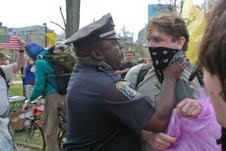What does the “decisive moment” look like in the age of cell phone cameras, Twitter, and corporate media? Henri Cartier-Bresson, one of the founding members of the most prestigious photo collective in the world, Magnum Photos, said, “There is nothing in this world that does not have a decisive moment,” to explain his attitude as a photographer covering post-World War II social upheaval in India and China. Photojournalism has had a tremendous impact on social movements, how they grow and how they are perceived by the media-consuming public.
Currently, the demand for the work of photojournalists has drastically decreased and the market is saturated with photos. There won’t be another LIFE Magazine to devote pages upon pages to images of social change. However, that doesn’t mean the role of a photojournalist is any less important. The way images are viewed is adapting to the social media revolution and the proliferation of photo technology.
In the last year, I have taken three photographs that have “gone viral.” One image is from the Slut Walk marches, another from the first week of Occupy Wall Street in New York, and most recently, a photo of the Boston Common at a counter-protest to a Tea Party rally featuring anti-gay speakers. These photos have gotten from hundreds of thousands to millions of views – all as a result of social media and each progressively reaching more viewers and bigger media outlets.
You may have seen my photo of a police officer with his hand around the neck of a masked protester who was holding a lavender wig. I took the shot Sunday afternoon at the Boston Common, uploaded a set of 45 pictures three hours later to the photo-sharing website Flickr, and got 30,000 views within the next three hours. I had media requests from the majority of local media by Monday morning, and by Tuesday morning the photo was on the front page of the Boston Metro and in the metro section of The Boston Globe.
The Metro dubbed it “the choke heard around the ‘hub,’” and local television reporters were asking if this was appropriate police response to a nonviolent protest. If an image I took can get the public to question police suppression of political speech, then I have done my job as a photojournalist.
In this situation, I feel a still image is more powerful than a video. The image captures one split second in time. It raises questions like: Why did the officer react like this? Did the protester provoke this? If the kid did do something to warrant a hand around his throat, it would have also warranted an arrest. The protester was not arrested.
A single frame can expose a broader truth. For example, the truth that protesters from the Occupy Movement have faced brutal police repression for the past seven months.
Was this incident the most brutal? Not even close. But it has shown millions of people that this is what protesters are faced with when they stand up against hate, bigotry, and sustained oppression from the state. This oppression was partially exposed in this frame, this one “decisive moment.”
The modern day “decisive moment” will depend just as much on how the image is shared, as it will depend on what the image contains. The “decisive moment” will need to be on the Internet before the mainstream media noise machine starts its spin. It will be taken by anyone with an eye for capturing what would otherwise go unseen, regardless of the expense of the camera or the credentials of the photographer. It will be immediately accompanied by commentary from all parties involved, connected via the Internet. It will spread like wildfire, not waiting to be printed in a newspaper or shown on the nightly news.





















































